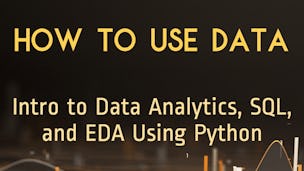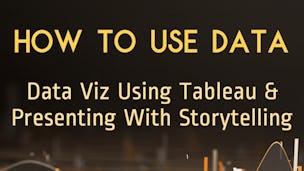"Introduction to Predictive Analytics and Advanced Predictive Analytics Using Python" is specially designed to enhance your skills in building, refining, and implementing predictive models using Python. This course serves as a comprehensive introduction to predictive analytics, beginning with the fundamentals of linear and logistic regression. These models are the cornerstone of predictive analytics, enabling you to forecast future events by learning from historical data. We cover a bit of the theory behind these models, but in particular, their application in real-world scenarios and the process of evaluating their performance to ensure accuracy and reliability. As the course progresses, we delve deeper into the realm of machine learning with a focus on decision trees and random forests. These techniques represent a more advanced aspect of supervised learning, offering powerful tools for both classification and regression tasks. Through practical examples and hands-on exercises, you'll learn how to build these models, understand their intricacies, and apply them to complex datasets to identify patterns and make predictions. Additionally, we introduce the concepts of unsupervised learning and clustering, broadening your analytics toolkit, and providing you with the skills to tackle data without predefined labels or categories. By the end of this course, you'll not only have a thorough understanding of various predictive analytics techniques, but also be capable of applying these techniques to solve real-world problems, setting the stage for continued growth and exploration in the field of data analytics.

Intro to Predictive Analytics Using Python

Intro to Predictive Analytics Using Python
This course is part of How to Use Data Specialization

Instructor: Brandon Krakowsky
Included with
Recommended experience
What you'll learn
Implement data preprocessing and model training procedures for regression.
Interpret feature importance in decision trees and random forests.
Explain the difference between supervised and unsupervised learning.
Skills you'll gain
- Random Forest Algorithm
- Python Programming
- Classification And Regression Tree (CART)
- Machine Learning
- Machine Learning Methods
- Unsupervised Learning
- Predictive Analytics
- Forecasting
- Analytics
- Feature Engineering
- Logistic Regression
- Statistical Modeling
- Decision Tree Learning
- Model Evaluation
- Regression Analysis
- Supervised Learning
- Predictive Modeling
- Skills section collapsed. Showing 8 of 17 skills.
Details to know

Add to your LinkedIn profile
7 assignments
See how employees at top companies are mastering in-demand skills

Build your subject-matter expertise
- Learn new concepts from industry experts
- Gain a foundational understanding of a subject or tool
- Develop job-relevant skills with hands-on projects
- Earn a shareable career certificate

There are 3 modules in this course
Module 1 introduces you to predictive analytics, covering essential models such as linear and logistic regression. This is where you start to learn how to forecast future trends from historical data.
What's included
20 videos4 readings2 assignments2 app items
Module 2 expands your knowledge into decision trees and random forests, offering a deeper dive into more complex supervised learning models that enhance your predictive analytics capabilities.
What's included
16 videos4 readings2 assignments2 app items
Module 3 explores unsupervised learning and clustering, guiding you through the nuances of model comparison and the art of identifying patterns without predefined labels.
What's included
8 videos4 readings3 assignments1 app item
Earn a career certificate
Add this credential to your LinkedIn profile, resume, or CV. Share it on social media and in your performance review.
Instructor

Offered by
Explore more from Data Analysis

University of Pennsylvania

University of Pennsylvania
Why people choose Coursera for their career

Felipe M.

Jennifer J.

Larry W.

Chaitanya A.

Open new doors with Coursera Plus
Unlimited access to 10,000+ world-class courses, hands-on projects, and job-ready certificate programs - all included in your subscription
Advance your career with an online degree
Earn a degree from world-class universities - 100% online
Join over 3,400 global companies that choose Coursera for Business
Upskill your employees to excel in the digital economy
Frequently asked questions
To access the course materials, assignments and to earn a Certificate, you will need to purchase the Certificate experience when you enroll in a course. You can try a Free Trial instead, or apply for Financial Aid. The course may offer 'Full Course, No Certificate' instead. This option lets you see all course materials, submit required assessments, and get a final grade. This also means that you will not be able to purchase a Certificate experience.
When you enroll in the course, you get access to all of the courses in the Specialization, and you earn a certificate when you complete the work. Your electronic Certificate will be added to your Accomplishments page - from there, you can print your Certificate or add it to your LinkedIn profile.
Yes. In select learning programs, you can apply for financial aid or a scholarship if you can’t afford the enrollment fee. If fin aid or scholarship is available for your learning program selection, you’ll find a link to apply on the description page.
More questions
Financial aid available,

